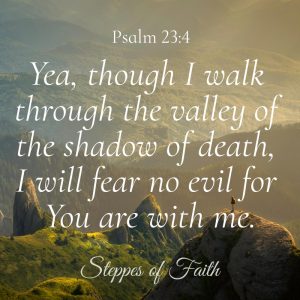One of the first roads to climb on the snowy and icy slopes of Denali, North America’s highest peak, is called the West Rib Highway. The first ascent was covered in the American Alpine Journal of the 1960s and in the sports section of July 13, 1959 of Time Magazine The route is relatively safe, with the exception of the approach, which crosses a narrow and deep glacial valley between Denali, on the left, and Kahiltna, on the right. These slopes constantly generate avalanche of snow and ice, that descend into the valley, so the valley has earned the title of “Death Valley”. Climbers often climb this path at night, as cooler temperatures make it safer.
Although the ancient Israelites did not face these cold dangers, they (like all of us) faced many trials, temptations, pains, and afflictions in their lives and, finally, the latter enemy to overcome. : death itself. The journey to heavenly Promised Land carries many risks and dangers, and we need a shepherd to help us get there safely.
- Livestock refers to the activities of people who obtain their main livelihood from herds of sheep.
- Goats.
- Cows.
- Camels.
- Pigs or donkeys.
- When Israel conquered and settled in the land of Canaan.
- They became farmers.
- But did not abandon the pastures.
- They have developed an agricultural and pastoral economy.
- Especially on the semi-arid slopes to the east and south of the Mountains of Judah.
- The Israelites engaged in breeding.
What were the duties of the shepherd to protect his flock in this important role in ancient Israel?More immediately, he had to provide food and water, making sure the herd did not graze excessively in a given area. I had to rest. He had to protect his flock from predators, both from wild animals (wolves, bears, leopards, and lions) and from humans (see Job 1:14-15). He also had to protect his flock from other dangers, including very destructive and strong hot winds, as well as from diseases and even the harsh nature of the desert.
This concept of grazing spread metaphorically and applied to the kings of the ancient Near East. The tradition of a sovereign shepherd goes all the way to written history. Take the example of Hammurabi, the famous king of the Amorians whose code of laws can be found at the Louvre Museum in Paris; its code is a good example of pastoral language applied to government officials. In the prologue, it states:
Anum [the supreme god in his pantheon] and Enlil, to give good food to the people, appointed me. I am Hammurabi, the shepherd, called by Enlil who amassed riches and abundance, provider of everything, bond between heaven and earth.
This code of law conveys a great concern for justice. It is obvious that Hammurabi considered himself the ideal king who ruled the people and did justice in his name.
The figure of the shepherd also extended to the kings and rulers of Israel. Israel’s leaders were also continually called shepherds; however, Israeli leaders have repeatedly failed to meet their obligations (e. g. Jr 23). Even so, the image of a shepherd was also applied to God Himself (for example, Os 4. 16) Throughout the history of redemption, it has become increasingly apparent that God would raise a shepherd who would faithfully do justice, protect his sheep, care for them and heal them, put wounded bandages, and take them to peaceful places.
This is the great comfort that Psalm 23 brings: although the Psalmist has not faced a potential fatal blow from the avalanche of snow and ice on his right and left as he crossed the valley in the shadow of death, he has faced many dangers. , like us: chronic and sick physical and psychic distress, economic hardship, anxiety and anguish towards loved ones, enemies outside and inside, various forms of betrayal and loss; however, the Psalmist affirmed and knew that the Lord, his divine shepherd, was with him in all this, trusted a majestic shepherd who was with him and a larger one to come, who would act as our shepherd, subjugating himself, governing us and protecting us, containing and subjugating all his enemies and enemies?(Bref catechism of Westminster, question 26) Therefore, he could be courageous and have the courage to face the difficulties and afflictions of life, because the Lord was with him.

